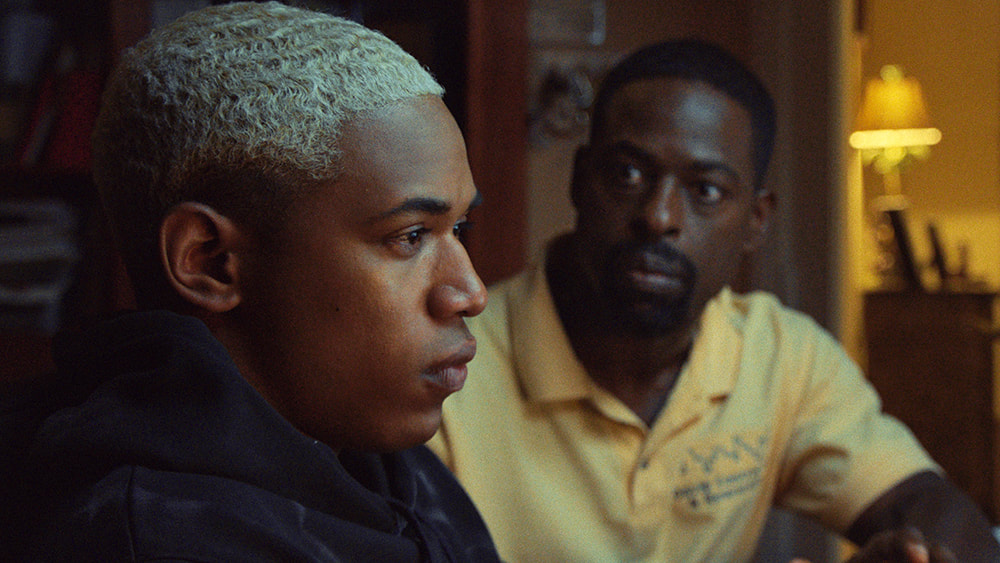As the film enters its second half, the focus shifts to Tyler’s younger sister Emily, played by Russell. She’s left to deal with the fallout of the first half’s events, as they leave her father and stepmother Catherine (Renee Elise Goldsberry) flailing and unable to tend to her needs. She finds solace with one of Tyler’s teammates, a good-natured goober named Luke (Lucas Hedges). Emily’s half of the film takes a significant downshift from Tyler’s half, becoming almost Malickian in how she and Luke commune with nature to deal with their respective traumas while falling deeply in love. Shults uses her as a release valve for the men in her life, parlaying an earlier silent comforting of Tyler into long unburdenings with her father as he wrestles with his failings and with Luke as he struggles with his relationship to his own father.
Both halves of the film could’ve been conceivably massaged and lengthened into their own individual films. The dissolution of Tyler’s life calls to mind plenty of tragic comparisons, while Emily moving from ostracism within her high school community towards some kind of acceptance is also imaginable. While both halves are excellent in their own ways, they don’t sit comfortably beside each other. The relative absence of each respective lead from their co-lead’s story accentuates how unnecessary they are to each other, at least as far as the plot’s concerned. Thematically, there isn’t much of a coherent link either, as Tyler’s father and Luke’s father have little in common, Tyler and Emily are treated differently by Ronald, and the evergreen theme of toxic masculinity dissipates once Emily takes over.
If the whole film doesn’t quite work as a single unit, it is bursting with meaning within smaller chunks. Primarily, the domineering father-son relationship that Tyler and Russell share is well-depicted and imagined, such that Russell is setting his son up for success but a narrow and specific kind of success with ironclad boundaries. Stay within those boundaries, and it’s easy to imagine Tyler running his own business or building a respectable life. However, because Russell is giving Tyler so few strategies beyond force and will, the path he’s set on is brittle. Russell explicitly states the ‘twice as good for half as much’ directive that Black Americans frequently live with, but Waves sees this as another poison pill imparted to these communities from a discriminatory society. The impossibility of failure or compromise only makes Tyler duplicitous and reckless, and he doesn’t have the bandwidth to imagine otherwise just as Russell doesn’t have the capability to accept that maybe his son won’t be a dominant wrestler. The impasse between the two is harrowing in its raw anger and in the dreadful inevitability of it.
Shults’ penchant for setting up an inevitable result has been demonstrated in each of his movies, and he’s getting better each time. Krisha put a ticking clock on a family dinner meltdown and It Comes at Night made the popping of a survivalist bubble a matter of time. Waves has the same kind of predictability, but it’s the kind where Shults organically constructs a series of events and reduces the likelihood of alternatives to the end result until what does happen, must happen. He does this by reveling, almost sadistically, in every second of scenes where help could be asked for, and is not. The sound design is key, especially in a brutal wrestling match where one can hear muscle fibers tearing. Shults also uses a lot of spinning, panoramic shots that could be interpreted as carefree exhibitions of limitless possibility, but they also establish a bubble around characters that, for them, creates a false sense of consequence-free behavior until it’s ultimately revealed as a well-constructed illusion.
I’m still most partial to the you-are-there intensity of Krisha, but Waves signifies a consistency in Shults and his own inevitability of one day making something great and unimpeachable. So many of the ingredients are here, though they aren’t evenly distributed throughout his bifurcated film. Waves takes a lot of risks, not only in its potentially controversial casting and plotting, but structurally and formally as well. Those risks mostly pay off, but one can’t help but wonder about the concentrated power of a more fleshed-out telling of either Tyler’s or Emily’s story. Waves is a strong film, but it hints at the possibly stronger film or films nestled within it. B

 RSS Feed
RSS Feed